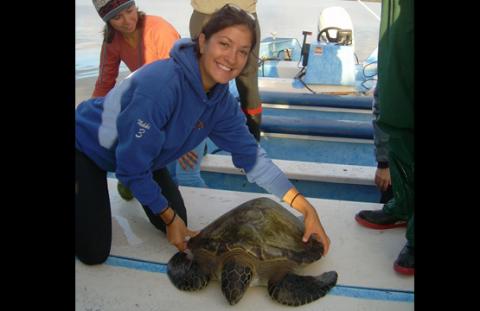

University of Rhode Island Graduate School of Oceanography
I appreciate the multidisciplinary aspect of habitat mapping, that there are always questions waiting to be answered, and I am always learning! Collecting data and figuring out how data relates to each other is like putting together pieces of a puzzle.
Education
B.S., Marine Biology, University of Rhode Island
M.S., Oceanography, University of Rhode Island
Salary
$40,000 - $60,000
Contact
What is your current job and what does it entail?
I am a researcher at the University of Rhode Island's Graduate School of Oceanography in Narragansett, R.I. I work in the Paleomagnetics and Coastal Mapping Laboratory led by Dr. John King. My primary focus is seafloor habitat mapping, which generally entails conducting acoustic (side-scan, bathymetry, sub-bottom) surveys and ground-truth (sediment samples, biological samples, underwater video/photography, cores) surveys of the seafloor. These datasets are then integrated to reveal spatial patterns and distributions of seafloor habitats, as well as to recognize and understand physical-biological relationships within and between habitat types. Approximately 20% of my time is spent in the field collecting data and the remaining 80% is spent in the office processing, analyzing and interpreting data and writing reports. Most recently, my work has been conducted as part of the Rhode Island Ocean Special Area Management Plan (SAMP) initiative and follow-on projects, largely in response to interest in offshore wind energy development. The Ocean SAMP is a federally recognized marine spatial planning tool developed based on best available science to assist in making appropriate management decisions to protect and develop Rhode Island's ocean-based resources.
What was the key factor in your career decision?
The key factor in my career decision was ultimately my love and passion for the ocean -- a classic response, but true! My father spent 25 years in the Navy, during which my family and I lived in various locations along the coastal United States. I explored majors in English and history my freshman year of college; then, after taking an introductory course entitled "History of the Sea," combined with my adoration of sea turtles, I decided to change directions completely and pursue a major in marine biology with minors in underwater archeology and marine affairs. My senior year as an undergrad, I landed a fellowship in the lab of Dr. John King performing habitat mapping research -- I was hooked. I stayed in the lab, earned my M.S. degree in oceanography, and am currently employed as a researcher for the University.
What do like most about your career?
I appreciate the multidisciplinary aspect of habitat mapping, that there are always questions waiting to be answered, and I am always learning! Collecting data and figuring out how data relates to each other is like putting together pieces of a puzzle. It is extremely rewarding when you know your work has direct application to an important effort. For me, it is when final habitat maps and findings can be put to good use -- such as contribute to a better understanding of the ecosystem, identify physical-biological relationships, inform management decisions, and further methodologies used in the field of seafloor habitat mapping. I also very much enjoy using ArcGIS mapping and spatial analysis software and being out on research vessels to conduct fieldwork.
What do you like least about your career?
What I like least about my career is not being able to spend as much time as I would like focusing on my research. This challenge arises because of administrative work that must be done and because deadlines are often fast to approach. In addition, I am a person who strives to do my best and has a high attention to detail, which can lead to stressful situations, as often there are a never-ending number of questions to be answered, combined with limited time and resources to accomplish studies.
What do you do to relax?
I am most relaxed when I am on or near the water -- fishing with my family, snorkeling, reading a book at the beach, or walking along the shoreline chatting with a friend. I also enjoy visiting the aquarium, shopping and hanging out with my family and friends.
Who are your heroes/heroines?
There are many people I would consider to be a hero/heroine; I really admire those who are strongly motivated to achieve their goals, are not afraid to stand up for what they believe, are eager to share their knowledge and are selfless.
What advice would you give a student who expressed an interest in pursuing a career in your field?
Science is a fun, interesting and rewarding career! First, I would encourage everyone to follow his or her dreams and instincts! If you are or think you are interested in a career in anything, try it! Get involved -- take classes, find an internship, talk to professors or people in that field, ask questions, read related literature. If you find that career is not for you, you can always change directions -- I did! Second, take school seriously -- especially when practicing your critical thinking and writing skills -- these can always be improved upon and will serve to your advantage. Third, do not be shy -- in my journey to my science career, I have found people are usually eager to help!
Are career opportunities in your field increasing or decreasing and why?
I believe career opportunities in my field of habitat mapping are increasing. This field has direct application to real-world issues, especially in the face of increasing interest in marine spatial planning efforts and offshore alternative energy development, and the unconquered quest for knowledge. Furthermore, science is an ever-changing field and one can never know what exciting opportunities might arise in the future.
What will you be doing 10 years from today?
I envision I will be doing the same work I am doing today. Though, I always welcome new challenges and projects.
